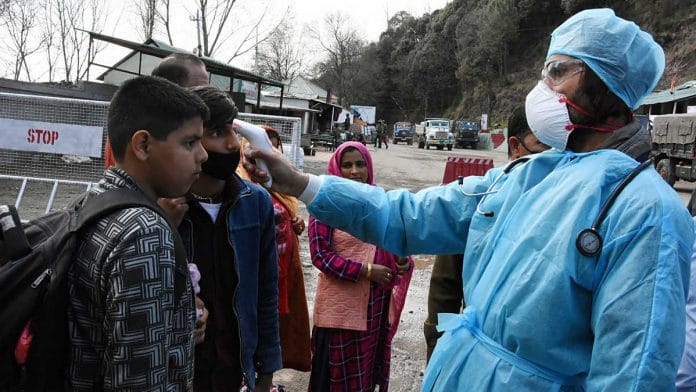New Delhi: With more than 4.2 lakh confirmed coronavirus cases and 19,100 deaths across the world, the coronavirus pandemic continues to wreak havoc in several countries and scientists are in a race to find a treatment for the deadly virus.
ThePrint brings you the top developments on Covid-19 from across the globe.
New coronavirus infections drop in Italy
Italy is witnessing a decline in the rate of new coronavirus cases after a two-week lockdown but after 743 people died Wednesday, the worst is not yet over for the country.
Italy is the worst-hit nation in the coronavirus pandemic and the country’s death toll has surpassed China’s, where the infection first broke out. 6,820 people have died in Italy so far while over 69,000 people have been infected by the virus.
The number of deaths on a single day declined Monday but Wednesday saw a fresh surge. However, new infections rose by just eight per cent — the lowest since Italy registered its first death on 21 February. In the beginning of March, this rate was as high as 50 per cent.
Also read: Chaos hits Indian ports as coronavirus lockdown hurts operations
Israel to start remdesivir clinical trials to test effectiveness against Covid-19
Scientists at the Beth Israel Deaconess Medical Center (BIDMC) are all set to conduct two clinical trials of the experimental drug remdesivir to test its safety and efficacy against the novel coronavirus.
They are enrolling patients to test the drug that was initially developed to fight Ebola.
According to WHO assistant director-general Bruce Aylward, “There is only one drug right now that we think may have real efficacy, and that’s remdesivir.”
The drug had shown promise in treating Ebola till Phase 3, when a study conducted in the Democratic Republic of the Congo revealed that it was less effective in preventing deaths from the virus than its competitors.
New mobile app lets users track coronavirus symptoms in UK
Researchers at the Kings College London have launched a new app, which tracks symptoms related to the novel coronavirus and allows people to self-assess their symptoms daily.
Around 5,000 twins and their families across the UK have been recruited to test the app that tracks the progress of the disease in real time.
Comparing genetically identical twins with non-identical twins will enable researchers to separate the effects of genes from environmental factors such as diet, lifestyle, previous illnesses and infections, and the microbes within the gut.
Users will record information about their health on a daily basis, including temperature, tiredness and symptoms such as coughing, breathing problems or headaches.
Any participants showing signs of Covid-19 will be sent a home testing kit to better understand what symptoms truly correspond to the infection. The app will also be available to the general public, however, they will not have access to home testing presently.
Also read: 100-year-old TB vaccine now being tested for Covid-19, India may conduct a trial too
Supercomputer simulations of Covid-19 to help drug discovery
Scientists are using a supercomputer to prepare a digital model of the novel coronavirus that can simulate the interactions of each of the 200 million atoms the virus is made of.
The model developed using the Frontera supercomputer at the University of Texas can help researchers design new drugs and vaccines to combat the coronavirus.
Researchers have already completed the initial simulations to build the first complete all-atom model of the SARS-COV-2 coronavirus exterior envelope. They are now testing the first parts of the model and optimising the code.
The team says that with a good model of the virus, it will become easier to locate possible ways to target it.
At least one person lost his job in 29 per cent households in New York
Amidst the two-week long coronavirus lockdown in New York City, nearly three in ten residents report that they or someone in their household has lost his or her job.
The layoffs have disproportionately hit Hispanics and lower income city residents, according to a survey carried out by New York’s The City University.
Additionally, 80 per cent of the city’s residents said that their ability to get the food they need also reduced exponentially, and two-thirds reported a loss of social connection in the past week, suggesting that the isolation is taking a toll on residents.
Also read: Home ACs don’t pose coronavirus threat, but central air conditioning could raise risks






